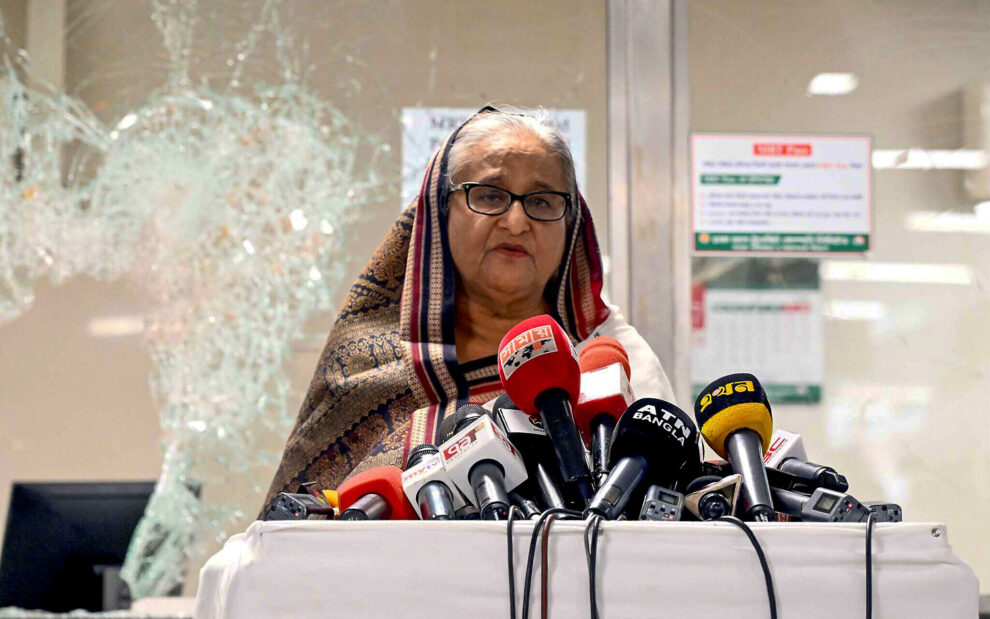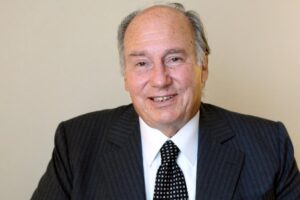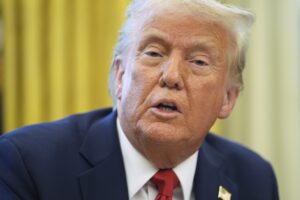The image of Sheikh Hasina, the once revered ‘queen’ of Bangladesh, fleeing to neighbouring India is one that would have been unimaginable just a few weeks ago. Yet here we are, watching in disbelief as the tides of power shift in dramatic and unpredictable ways.
Just months ago, I wrote about the precarious situation in Bangladesh, warning that the anti-Hasina movement was gaining traction despite her apparent electoral victory. The world, however, dismissed these concerns, blinded by the spectacle of economic success that Bangladesh had become.
Between 2009 and 2023, the country’s meteoric rise to prosperity was hailed as a global case study – an exemplary tale of development, marked by a booming textile industry, remarkable Gross Domestic Product (GDP) growth, and poverty reduction. But the shine of success masked a darker undercurrent, one that would eventually unravel the fabric of Hasina’s long-standing reign.
The streets of Dhaka, once bustling with the energy of a nation on the rise, are now scenes of chaos and rebellion. The protests that simmered for years under the surface have erupted into a full-blown revolt, ending with Hasina’s ouster.
How did the world fail to see this coming? The signs were all there: dissenting voices were systematically silenced, Opposition leaders jailed, and the media muzzled. Hasina’s iron grip on power tightened with each passing year as her inner circle, a coterie of loyalists, operated with impunity.
The stories of those who dared to speak out – journalists, civil society leaders, and political thinkers – are chilling. They were either silenced, driven into exile, or worse. How could a nation so full of promise descend into this anarchy? It’s a question that should haunt us all.
No leader is invulnerable
Absolute power, it’s said, corrupts absolutely. Bangladesh’s tragedy is a stark reminder of this truth. When leaders become untouchable, when power is concentrated in the hands of a few, the seeds of tyranny are sown.
Hasina’s rule, once praised for its decisiveness, devolved into dictatorship. The label ‘dictator’ was whispered in hushed tones, and eventually, it became a rallying cry for millions.
The parallels with other global uprisings are striking. Consider the Arab Spring, where long-standing regimes crumbled under the weight of public dissent. Or the fall of Nicolae Ceaușescu in Romania, whose downfall was as swift as it was brutal. How about the mass movement in the paradise of the world, Sri Lanka, where President Gotabaya Rajapaksa, democratically elected through a fair and peaceful election, had to flee with the First Lady under tragic circumstances in 2022?
These events remind us that no leader, no matter how powerful, is invulnerable. When the balance of power is lost, when checks and balances are eroded, collapse is inevitable.
What’s perhaps most intriguing is how the world turned a blind eye to the warning signs in Bangladesh. Was it because the country’s economic success made it a darling of the international community? Or was it because Hasina’s grip on power seemed unassailable?
The recent election, lauded by some as a democratic triumph, was in reality anything but. It was a facade, a carefully orchestrated performance designed to maintain the illusion of legitimacy. But beneath the surface, the discontent was palpable, growing stronger with each passing day. The result? A rebellion that no one saw coming, yet one that, in hindsight, seems almost inevitable.
The newly-formed Interim Government under Nobel laureate Prof. Muhammad Yunus thankfully ended early speculations of a military regime, which could have been a catastrophe not only for the country but also for the South Asian region, which is one of the politically and economically sensitive regions of the world with two billion lives including a sizeable youth population.
Prof. Yunus, once the face of Bangladesh due to his efforts to uplift the underprivileged through the Grameen Bank, is no stranger to controversy. With his nomination on the cards, a powerful global media drew a Yunus-Clinton connection and the rumour mill started playing the usual US hand in the Hasina exit, which was rejected by the US authorities swiftly.
Hasina found a safe haven in India, and the US revoked her visa immediately; reports surfaced that she may seek asylum in the UK to live with sister. However, the UK too rejected her. The ‘queen has lost her castle, and she has become an ordinary citizen just like you and me.
Sobering reminders
Now, as the dust settles, we must ask ourselves: how did we miss the signs? How did a country that was once a torchbearer of hope for the developing world fall into such disarray? And most importantly, what lessons can we learn from this collapse?
The fall of Hasina is a sobering reminder that economic success cannot mask the rot of autocracy. It underscores the necessity of democratic institutions, checks and balances, and a free press. For without these, even the most promising of nations can find itself on the brink of ruin.
As we look to the future, we must not forget the lessons of Bangladesh. We must remain vigilant, questioning, and critical, lest we find ourselves blindsided once again by the unravelling of yet another ‘success story’. The fall of a leader who once seemed untouchable should serve as a cautionary tale for all those who believe in the illusion of absolute power.
Decay masked by a glittering facade
A casual text to Sri Lanka’s State Minister of Foreign Affairs led to an unexpected meeting the very next day, setting the stage for a conversation that would unearth troubling reflections on South Asia’s volatile landscape.
The meeting took place at the magnificent Foreign Ministry building on Sir Baron Jayatilaka Mawatha, nestled in the historic heart of Colombo Fort. The grandeur of the building, with its colonial architecture, transported me back in time – a poignant reminder of the complex legacies that continue to shape the DNA of the South Asian region.
As I sat across from Tharaka Balasuriya, a third-generation Sri Lankan political leader, a father to two beautiful young daughters, it was hard not to feel the weight of history pressing down on us both.
Tharaka and I had last met in May 2023 – incidentally in Dhaka, attending a high-profile geopolitical conference where the Chief Guest was the ‘queen’ Sheikh Hasina. As she took the stage to give her speech, not in anyone’s wildest dreams could the current situation in Bangladesh have been predicted.
However, I noticed something unusual even by flamboyant South Asian standards. Her security detail was mammoth, the whole road to the hotel was blocked completely until she left the premises. Perhaps only she knew the real story of Bangladesh and where it was heading to in an election year in 2024.
That gathering now seemed like a distant memory, a relic of a time when the future still appeared bright for Bangladesh. As we sipped black coffee, the conversation began to unravel with a question that had been ringing in my ears since the protests started in the country. “Tharaka, did you ever think when we were in Dhaka in May 2023, that we would see this day where Bangladesh is burning and rotting like hell?”
It was a loaded question, one that hung in the air like the thick clouds outside. Tharaka, a man of few words and even fewer public appearances, was not easy to get talking to. He is a happy introvert, someone who shuns the limelight despite the political pedigree that defines him. But there was a seriousness in his eyes, a readiness to confront the harsh realities we had both been avoiding.
“No, how could I?” he finally replied, his voice tinged with disbelief. “Did you?” I shook my head. We both agreed that back in May 2023, no outsider to Bangladesh would have predicted the epic fall that was to come. But perhaps that was the problem – perhaps we had all been outsiders, too detached to see the storm brewing on the horizon.
The Bangladesh we had visited in 2023 was a country on the edge, but few could have imagined just how close to the precipice it truly was. The signs of decay were there, but they were masked by the glittering facade of economic success. The streets of Dhaka were bustling, the GDP was rising, and the international community was singing praises.
Beneath the surface, however, the rot had already set in. It was a country that had fallen victim to the intoxicating lure of absolute power, where dissent was crushed and democracy was an illusion.
As Tharaka and I continued our conversation, the parallels between Bangladesh and other nations that had suffered similar fates became impossible to ignore.
We spoke of the Arab Spring, where long-standing regimes were toppled by the very people they had oppressed. We recalled the fall of leaders who, like Hasina, had once seemed untouchable. In those moments, I realised that Bangladesh’s tragedy was not unique – it was part of a broader pattern of power unchecked and corruption unchallenged.
Why didn’t we see it? Because we were looking at the wrong things. We saw the skyscrapers, the trade deals, the booming economy, but we failed to see anything beyond.
The power of public outrage
As I left the Foreign Ministry that day, the colonial walls that had once seemed so impressive now felt like a stark reminder of the fragility of power. The fall of Bangladesh was a lesson in the dangers of complacency, a warning that even the most seemingly stable of nations can crumble when the foundations of democracy are allowed to erode. The echoes of that day in Dhaka in May 2023 now serve as a haunting reminder of the price we pay when we ignore the signs.
For me, seeing Hasina flee Bangladesh was like a flashback to Gotabaya Rajapaksa’s dramatic escape from Sri Lanka in 2022. The parallels between these two events are stark, both marked by the fall of leaders who once seemed untouchable but were ultimately overwhelmed by the fury of their people.
Just as Rajapaksa’s hasty departure was a signal of the deep discontent that had been brewing in Sri Lanka, Hasina’s exit is a testament to the explosive power of public outrage when it reaches its boiling point. The digital media in Sri Lanka seized on these similarities, going into overdrive as they reported on the chaos in Bangladesh – riots, murders, and unbridled mayhem that had brought the nation to its knees.
Prez Polls and the IMF agreement
As Sri Lanka gears up for its Presidential Election on 21 September, these images of Bangladesh serve as both a warning and a weapon. President Wickremesinghe’s supporters, eager to solidify his hold on power, have been quick to draw comparisons. They’ve painted a grim picture, asking the people: “Do you want a Bangladesh in Sri Lanka?”
It’s a chilling question, one that plays on the fears of a nation that has only just begun to recover from its own descent into turmoil.
Wickremesinghe, who is credited with restoring a semblance of normalcy to Sri Lanka after the economic collapse and mass protests of 2022, now positions himself as the man who delivered stability to the country. The implication from the Wickremesinghe campaign team is clear: a vote against the President is a vote for instability, for the kind of lawlessness that has engulfed Bangladesh. However, his opponents are countering this with the possible renegotiation of the International Monetary Fund (IMF) agreement, higher cost of living, and corruption.
The Wickremesinghe camp has defended the iron-clad IMF agreement and continues to challenge his main rivals, Opposition Leader Sajith Premadasa and Janatha Vimukthi Peramuna (JVP)/National People’s Power (NPP) Leader Anura Kumara Dissanayake (AKD). The IMF agreement will be the key issue of the presidential campaign starting on 15 August, where the Opposition’s position of what can be renegotiated will be the key differentiator of the economic story.
The big five in the IMF negotiation, President Wickremesinghe; his deputies Shehan Semasinghe and Ranjith Siyambalapitiya; and public officials, Finance Ministry Secretary Mahinda Siriwardana and Central Bank of Sri Lanka Governor Dr. Nandalal Weerasinghe, form the defence. The Premadasa camp, consisting of his economics team – Dr. Harsha de Silva, Eran Wickramaratne, Kabir Hashim, and Sri Lanka Podujana Peramuna (SLPP) crossover Dr. Nalaka Godahewa, will provide the countering.
The other main candidates in the race AKD will be supported by Sunil Handunnetti and the economics team. Unfortunately, for AKD, Handunnetti’s multiple recent remarks on the economy have been laughed out not only by corporate Sri Lanka but also by people with financial literacy.
His recent remark about being prepared to accept investments even if it’s black money under an AKD government was indeed laughable. He may have not realised that money laundering is a serious issue for any country and scrutiny in the financial sector of the world for money laundering is a serious and tedious affair. The AKD team still has Prof. Anil Jayantha and a few who could step into the counter debate against the big five of the Government and the Premadasa economics team.
The best way to win the public is to show contrasting policies and action plans upon gaining power. This is the first time in Sri Lanka that an IMF agreement will take centre stage at a presidential campaign. Either the candidates will be revealed or the duplicity of the IMF will be revealed before 21 September. It’s a worthy debate. It’s a worthy challenge.
Sri Lanka’s foreign policy
In the days leading up to the election, these narratives will only intensify. The images of Dhaka burning and a leader fleeing in the dead of night will be seared into the public consciousness. It’s a powerful reminder of how quickly things can spiral out of control, of how fragile the peace that Sri Lanka enjoys truly is.
The comparison to Bangladesh is meant to galvanise voters, to make them believe that their choices in the coming election are about more than just politics – they are about survival. As the polls draw nearer, the shadow of Bangladesh will loom large over Sri Lanka, a cautionary tale that everyone, from the highest echelons of power to the ordinary citizen, will be forced to reckon with.
Tharaka leaned forward, his expression serious as he delved into the complexities of Sri Lanka’s foreign policy – a subject that has become increasingly delicate given the island’s strategic significance.
“Sri Lanka is always first,” he began, his tone unwavering. “That’s not just a principle, it’s a necessity. We have to navigate a world where every move is scrutinised by the geopolitical giants – China, the US, India, Japan, and Russia. Each of these nations has interests in our region and we have to be honest and transparent in our dealings with them.”
He paused, letting the weight of his words settle in. “But honesty doesn’t mean submission,” he continued. “We’ve built relationships with these powers, and it’s crucial that we maintain them without compromising our own sovereignty.
“Sri Lanka cannot afford to hurt any of these friendly nations; our survival depends on balancing these relationships carefully. It’s a tightrope walk, but it’s one we’ve managed before and we’ll continue to manage it as long as we prioritise our national interest.”
Tharaka’s insights highlighted the tightrope that Sri Lanka must walk as it navigates the web of global alliances and rivalries. Positioned at one of the world’s most important strategic crossroads, the island nation cannot afford to align too closely with any one power without risking the ire of another. The stakes are high, and the decisions made in Colombo reverberate far beyond its shores.
“We have to be pragmatic,” he quipped, “because in this game, every misstep can have serious consequences. But as long as Sri Lanka remains true to its interests and honest in its intentions, we can maintain the delicate balance that keeps us afloat in an increasingly turbulent world.”
As Sri Lanka approaches the Presidential Election, managing geopolitics has emerged as a central theme that could shape the nation’s future. Wickremesinghe, known for his diplomatic finesse, has been eloquently emphasising the importance of balancing Sri Lanka’s delicate geopolitical position. In contrast, his main rivals, Premadasa and Dissanayake, have focused more on pressing local issues, speaking directly to the grievances of the 22 million Sri Lankans still reeling from the economic crisis of 2022.
However, this election is not just about domestic concerns; it’s a race that the world’s most powerful nations – the US, China, India, Japan, and Russia – are watching with renewed interest. However, finally 17 million should decide the fate of the Presidential Election. It will be interesting to see how contrasting campaign strategies of the above three candidates could hit the equilibrium of external and internal stakeholders.
Geopolitical prize
The big five, each with their vested interests in Sri Lanka, are not driven by altruism but by a keen desire to safeguard their own strategic and economic stakes in the region. Sri Lanka’s location at the crossroads of major shipping lanes in the Indian Ocean makes it a geopolitical prize that these nations are eager to influence.
Strategic defence, foreign policy, alignments, and non-alignments aren’t just topics for academic discussion – they are the pillars upon which the future of Sri Lanka will rest. These issues need to be brought out of the back rooms of diplomatic circles and into the public discourse, especially during the campaign trail.
The people of Sri Lanka deserve to know where each candidate stands on these critical matters and what concrete action plans they propose to manage the complex geopolitical landscape. The world, too, needs clarity on where Sri Lanka stands, especially as it becomes increasingly apparent that the outcome of this election will ripple far beyond its borders.
As the election draws nearer, the candidates must provide not only solutions to the immediate crises but also a clear vision of how Sri Lanka will position itself in a world where global alliances are rapidly shifting. This isn’t just an election that will determine who leads Sri Lanka; it’s a referendum on how the nation will engage with the world at large. And with the big five watching closely, the stakes have never been higher.
Unexpected twist
The Sri Lankan presidential race has taken yet another unexpected twist with Field Marshal Sarath Fonseka re-entering the fray. The former war-winning Army Commander, once hailed as a national hero, has decided to break away from the Samagi Jana Balawegaya (SJB) and chart his own path to the presidency.
Now, Fonseka is back, this time with a renewed determination and a focus on issues such as corruption, the drug mafia, economic revitalisation, and strategic defence, which he articulated during a rare, cautious interview with Sidhant Sibal of WION News in India.
The re-entry of Fonseka into the race adds another layer of intrigue to an already complex election. President Ranil Wickremesinghe, ever the seasoned politician, has been weaving a compelling narrative around his own legacy, blending personal anecdotes, historical references, and his accomplishments, not just from the recent post-2023 recovery but from his previous terms in office as well.
Wickremesinghe has adopted a strategy of direct confrontation, challenging his opponents head-on and demanding they present their plans with the same clarity and detail he claims to offer. This approach has kept him in the spotlight, but it has also opened up new battlegrounds, especially with his former deputy, Sajith Premadasa.
Premadasa, bolstered by the formation of a new political alliance, has found a renewed sense of confidence. Despite Wickremesinghe’s relentless challenges, Premadasa remains focused on addressing the concerns of the masses, seemingly unperturbed by the President’s taunts to “show me your plan”. His strategy seems to be one of steady engagement with the electorate, relying on grassroots support rather than getting drawn into direct verbal duels with Wickremesinghe.
The Premadasa camp was jubilant on Friday’s Supreme Court judgment upholding the expulsion of Wickremesinghe loyalists in Parliament from the SJB. Vociferous political brothers-in-arms, Tourism, Lands, Sports, and Youth Affairs Minister Harin Fernando and Labour and Foreign Employment Minister Manusha Nanayakkara lost their Parliament seats, thus creating an opportunity for Premadasa to appoint two of his handpicks to Parliament.
There was one more reason for celebration in the SJB camp. The Party Chairman, Field Marshal Fonseka resigned from the party chairmanship and the party has proposed to appoint the veteran Imthiaz Bakeer Markar to the position.
Bakeer Markar, with 50 years in politics, was a loyalist of former President Ranasinghe Premadasa, the father of the SJB Leader. Bakeer Markar was the first choice of Premadasa for the chairmanship of the SJB when the party was founded. However, Fonseka was given the position.
Battle lines clearer
Meanwhile, AKD continues his tireless campaign, crisscrossing the country and addressing rally after rally. However, the relentless pace appears to be taking its toll. The firebrand leader who once seemed unstoppable now looks weary, his energy visibly waning compared to just a few months ago.
Compounding his challenges is the unhelpful rhetoric from his senior party member K.D. Lalkantha, whose continuous off-message statements are proving to be a liability rather than an asset to AKD’s campaign. The once sharp and focused campaign is now struggling to maintain its momentum, as internal discord threatens to undermine Dissanayake’s prospects.
However, AKD’s plan to revitalise the campaign next week and run the last leg will be crucial. It’s not how you start, it’s how you would end; this will be the key issue for the AKD campaign team.
Friday’s Supreme Court judgment will certainly increase the complexity of the Presidential Election. Wickremesinghe and Premadasa both have crossovers from other parties. By 15 August following nominations, the campaign will kick off, and by 21 September, Sri Lanka will decide. Dissolution of Parliament is imminent after 21 September and therefore all parliamentarians will have to battle to save their skins, but before that they will have to work for a presidential candidate.
As the election campaign intensifies, the battle lines are becoming clearer, yet the outcome remains unpredictable. With heavyweights like Fonseka re-entering the race and Wickremesinghe pushing a more aggressive narrative, the race is shaping up to be one of the most contentious and closely watched in Sri Lanka’s recent history.
The stakes are high, not just for the candidates but for a nation still recovering from its economic and political crises. Every move, every statement, and every alliance will count as the contenders vie for the highest office in the land.









